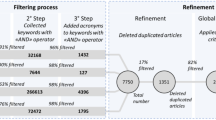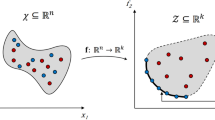Abstract
Conventional tolerance analysis is tedious and time consuming, which makes engineers resist doing it. Complex assembly problems are generally beyond the capabilities of most design and manufacturing engineers. In this paper, genetic algorithm, a kind of non-traditional optimization technique is used as the basic foundation for optimal tolerance allocation to help design and manufacturing engineers to overcome the shortcomings in the conventional tolerance stack analysis and allocation system.
Similar content being viewed by others
References
Speckhart FH (1972) Calculation of tolerance based on a minimum cost approach. J Eng Ind Trans ASME 94:447–453
Spotts MF (1973) Allocation of tolerances to minimize cost of assembly. J Eng Ind. Trans ASME 95:762–764
Sutherland GH, Roth B (1975) Mechanism design: accounting for manufacturing tolerances and costs in function generating problems. ASME J Eng Ind 98:283–286
Dieter GE (1983) Engineering design a materials and processing approach. McGraw-Hill, New York
Chase KW, Greenwood WH (1988) Design issues in mechanical tolerance analysis. Manuf Rev 1:50–59
Lee WJ, Woo TC (1989) Optimum selection of discrete tolerances. ASME J Mech Trans Automat Des 111:243–251
Dong Z, Hu W, Xue D (1994) New production cost-tolerance models for tolerance synthesis. J Eng Ind 116:199–206
Dong Z, Soom A (1991) Automatic optimal tolerance design for related dimension chains. Manuf Rev 3(4):262–271
Creveling CM (1997) Chapter 8: Tolerance Design. In: A handbook for developing optimal specifications. Addison Wesley, Reading, MA
Chase KW (1999) Tolerance allocation methods for designers. ADCATS Report No 99–6
Kalyanmoy D (1991) Optimal design of a welded beam structure via genetic algorithms. AIAA J 29(11):2013–2015
Davis L (1991) Handbook of genetic algorithms. Van Nostrand Reinhold, New York
Chase KW, Greenwood WH, Loosli BG, Haughlund LF (1989) Least cost tolerance allocation for mechanical assemblies with automated process selection. Manuf Rev ASME 2(4):49–59
Ramani B, Cheraghi SH, Twomey JM (1998) CAD based integrated tolerancing system. Int J Prod Res 36(10):2891–2910
Author information
Authors and Affiliations
Corresponding author
Rights and permissions
About this article
Cite this article
Prabhaharan, G., Asokan, P., Ramesh, P. et al. Genetic-algorithm-based optimal tolerance allocation using a least-cost model. Int J Adv Manuf Technol 24, 647–660 (2004). https://doi.org/10.1007/s00170-003-1606-1
Received:
Accepted:
Published:
Issue Date:
DOI: https://doi.org/10.1007/s00170-003-1606-1




